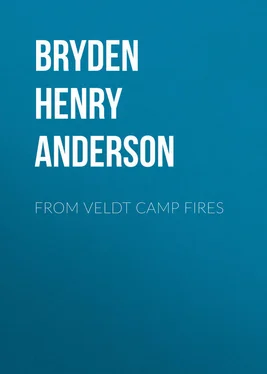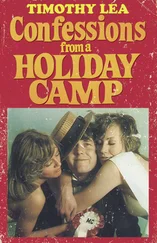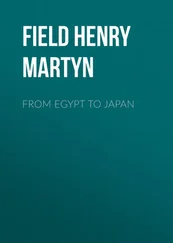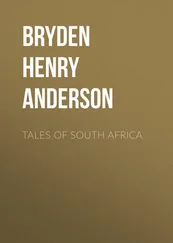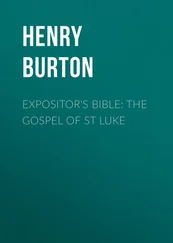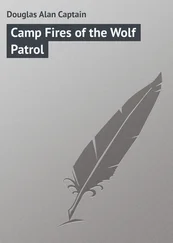Henry Bryden - From Veldt Camp Fires
Здесь есть возможность читать онлайн «Henry Bryden - From Veldt Camp Fires» — ознакомительный отрывок электронной книги совершенно бесплатно, а после прочтения отрывка купить полную версию. В некоторых случаях можно слушать аудио, скачать через торрент в формате fb2 и присутствует краткое содержание. Жанр: foreign_prose, foreign_antique, foreign_language, на английском языке. Описание произведения, (предисловие) а так же отзывы посетителей доступны на портале библиотеки ЛибКат.
- Название:From Veldt Camp Fires
- Автор:
- Жанр:
- Год:неизвестен
- ISBN:нет данных
- Рейтинг книги:3 / 5. Голосов: 1
-
Избранное:Добавить в избранное
- Отзывы:
-
Ваша оценка:
- 60
- 1
- 2
- 3
- 4
- 5
From Veldt Camp Fires: краткое содержание, описание и аннотация
Предлагаем к чтению аннотацию, описание, краткое содержание или предисловие (зависит от того, что написал сам автор книги «From Veldt Camp Fires»). Если вы не нашли необходимую информацию о книге — напишите в комментариях, мы постараемся отыскать её.
From Veldt Camp Fires — читать онлайн ознакомительный отрывок
Ниже представлен текст книги, разбитый по страницам. Система сохранения места последней прочитанной страницы, позволяет с удобством читать онлайн бесплатно книгу «From Veldt Camp Fires», без необходимости каждый раз заново искать на чём Вы остановились. Поставьте закладку, и сможете в любой момент перейти на страницу, на которой закончили чтение.
Интервал:
Закладка:
Presently, after passing some low hills, the white man posts himself in some thick cover in a shallow gorge commanding a broad, worn path. The bulk of the native hunters are sent far in front in a wide semicircle, to drive in elephants towards the ambush. There is a long interval, and then, crashing through the bush, appear at a slow trot the forms of five cow elephants. At the nearest of these the commander discharges his piece. The great creature, sore stricken, charges this way and that; at length, bristling with fifty spears, spouting the red blood from her trunk, and struck by other bullets from the white man’s snaphaunce, she falls heavily to earth. But while the party are gathered round the fallen beast, and the natives busy themselves in extricating their spears from the carcase, a sudden noise is heard behind. There, trumpeting hideously, comes a mighty single-tusked elephant – Mosusa’s elephant of the last night. The black men, naked and disencumbered, fly, all of them save one, far down the gorge, and scatter into the forest beyond. The white man, truth to tell, is bold and brave enough. Trusting to his heavy piece and his own pluck, he stands his ground. It is late indeed to fly, encumbered as he is with weapon and European clothing. As the grim monster charges down upon him, he steadily raises his snaphaunce and fires. But, just as he pulls trigger, Mosusa, standing behind his shoulder, jerks his right arm, the bullet flies wide of its intended mark, and strikes the elephant at the base of the great solitary tusk, just where the ivory is sheathed in the flesh. Mosusa leaps aside, there is a wild curse in Portuguese; in the same instant the savage scream of the enraged elephant thrills upon the hot morning air, the white man is flung to earth, and the great gleaming tusk drives deep through his body. Zingesi is avenged. The elephant withdraws his tusk, kneels upon the yet living man, and crushes the last remnants of humanity into a hideous, shapeless mass.
All this Mosusa has witnessed with bright eyes and the fiercest satisfaction. And now, raising his right hand, again he salutes the monstrous beast and speaks. “O thou great one, mighty chief, lord of the forest, I thank thee for what thou hast done. My time grows short: I die quickly. But thou, O my friend, live thou, live to slay the accursed white men, who pursue thy kindred and bring death and worse than death into this land of thine and mine.” As he runs on, Mosusa’s voice seems as the voice of one possessed; his eyes are fixed and open, as though gazing far into futurity. “And when thine appointed time comes,” he goes on, still addressing the mighty beast before him, “let thy tusk carry with it yet more of death and evil to the white man. There is blood now upon it: let blood be with it in its passage through the years to come, until it shall once more mingle with the earth again. And now, great one, one thing more has to be done. Let my blood mingle here with the white man’s: slay me, O my friend, and all shall be finished.”
But the elephant stands there in front of the frenzied African, its little eyes fixed upon his eyes, its body swaying ever so slightly from side to side, its trunk held out as if inquiring.
“I see what thou requirest, O great one,” cries Mosusa. “Thy blood too must flow, and at my hands!”
Suddenly he raises his spear, plunges it into the creature’s trunk, and as suddenly withdraws it. The beast screams with pain, the blood gushes forth from the spear-thrust, and in a moment, with a blow of the wounded member, the elephant has beaten the old native to the ground. In the next moment the re-infuriated beast kneels quickly upon Mosusa and crushes the life from his frame, as it had crushed the white man’s. The two bodies lie there together, misshapen, mangled, yet still warm. And now the elephant, having completed his work, turns slowly away and plunges into the jungle.
The scene had again faded from the dreamer’s eyes; yet its memory lingered clear, as Cecil Kensley awoke cold and shivering from his sleep. The fire burned low, the room was in darkness.
“Gad! what a curious dream!” he said to himself, as he rose stiffly from his lounge chair. “I never felt so cold in my life.” By the dim low firelight he made his way to a corner of the room, touched a button and switched on the electric light. The room in an instant assumed its normally bright and cheerful aspect. First putting some coals upon the fire, Kensley went to the sideboard, poured himself out a liqueur glass of brandy, and drank it down. “That’s better,” he said to himself. “I must have slept a deuce of a time. Can’t think why I got so cold.” He turned and looked at the clock. “Half-past seven, by Jove! I must dress sharp: these fellows will be here directly.”
First opening a door into an adjoining room, where he saw the dinner-table already prepared, he went to his bedroom and quickly dressed. He returned just in time to welcome his friends, who arrived almost simultaneously.
Of the three guests, two were Englishmen – average types of their race; the other a dark, good-looking foreigner, of engaging manners. Barreto, as they called him, spoke excellent English, and seemed to have a perfect knowledge of all topics – mainly pertaining to racing, matters theatrical, and cards – which came uppermost in the course of the evening. During the five minutes before dinner was announced one of the visitors caught sight of the tusk standing in the corner of the room.
“Hallo, Kensley!” he said, “what’s this? Something new, isn’t it?”
“Yes,” returned his host; “it’s a big tooth I came across in the warehouse lately. On the whole, it’s about the finest bit of ivory I ever saw; and so, as such specimens grow scarcer every year, I collared it. Makes a nice ornament, doesn’t it?”
“Magnificent!” rejoined Barreto, who had meanwhile approached, and was intently examining the tusk. “I’ve seen a good many tusks in my time, but I have never seen the fellow of this.”
“Why, where did you pick up your knowledge of ivory, Barreto?” asked Kensley. “I knew you were up to most things, but I didn’t know that you were a judge of elephants’ teeth.”
“Well, you see,” returned Barreto, “my family have had to do with Africa for between two and three hundred years. Several of them have left their bones there. I served as a lieutenant with the Portuguese troops in Mozambique when I was a youngster. After that I came home what you call invalidish – no, invalided – with fever; and, as I didn’t intend Africa to have my bones, I left the army and went into diplomacy.”
“I see!” replied Kensley. “Well, that tusk,” patting the great tooth affectionately, “must have been once something of a neighbour of yours. It came from behind Mozambique or Sofala. The elephant that carried it has, I take it, been dead many a long year. From the look of the ivory, and the way it’s been preserved, I should imagine that tooth has lain in some chief’s hut for best part of a century. Possibly it has been some cherished fetish. It could tell some tall stories, I’ll bet, if it could speak. But come along, you fellows: here’s dinner at last.”
The four men strolled into the pleasant ruby-lighted dining-room, sat themselves at the sparkling table, and for an hour devoted themselves heartily to excellent viands and wine, and to the exchange of much merry conversation.
At a quarter to ten, after some lingering over cigars and coffee, the party returned to the drawing-room, where card tables were laid. Two other men came in, and “poker” was started. The fortunes of the game waxed and waned, as they will do; but somehow, half-hour after half-hour, the luck ran dead against Barreto. It was easy to see that the Portuguese was a skilful and a smart player, yet, do what he would, bluff boldly or lie low, he steadily lost.
Читать дальшеИнтервал:
Закладка:
Похожие книги на «From Veldt Camp Fires»
Представляем Вашему вниманию похожие книги на «From Veldt Camp Fires» списком для выбора. Мы отобрали схожую по названию и смыслу литературу в надежде предоставить читателям больше вариантов отыскать новые, интересные, ещё непрочитанные произведения.
Обсуждение, отзывы о книге «From Veldt Camp Fires» и просто собственные мнения читателей. Оставьте ваши комментарии, напишите, что Вы думаете о произведении, его смысле или главных героях. Укажите что конкретно понравилось, а что нет, и почему Вы так считаете.
